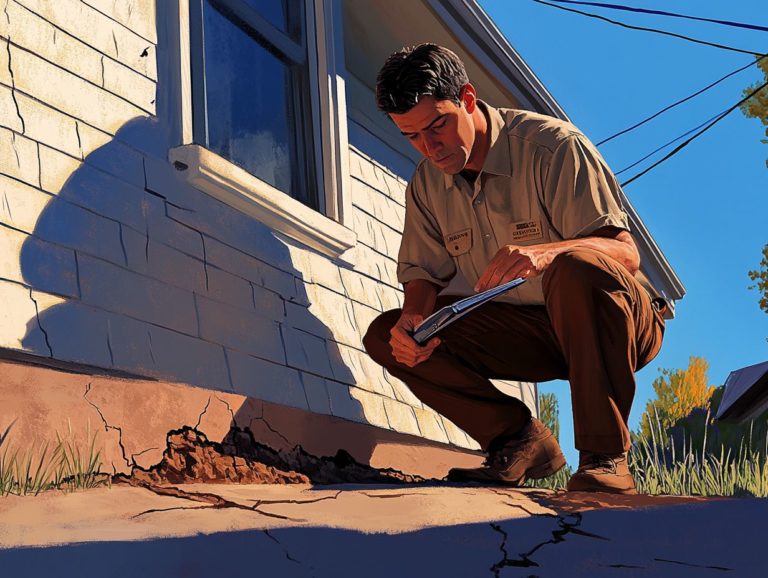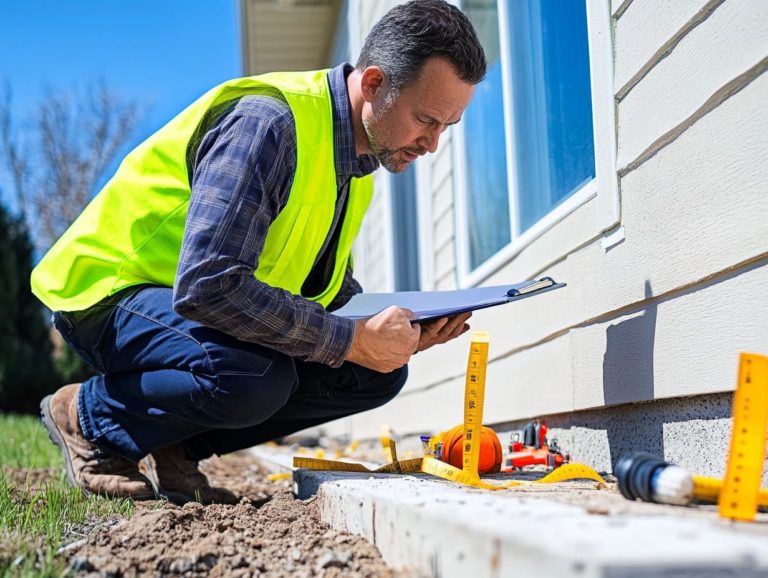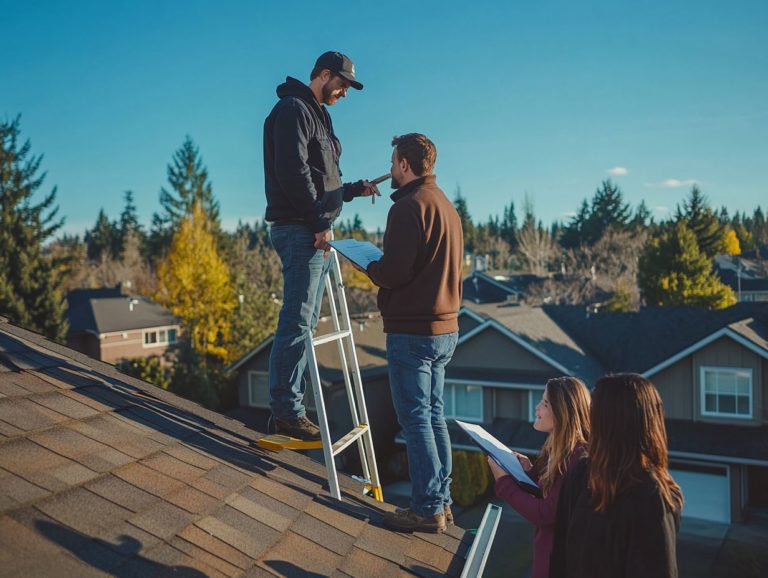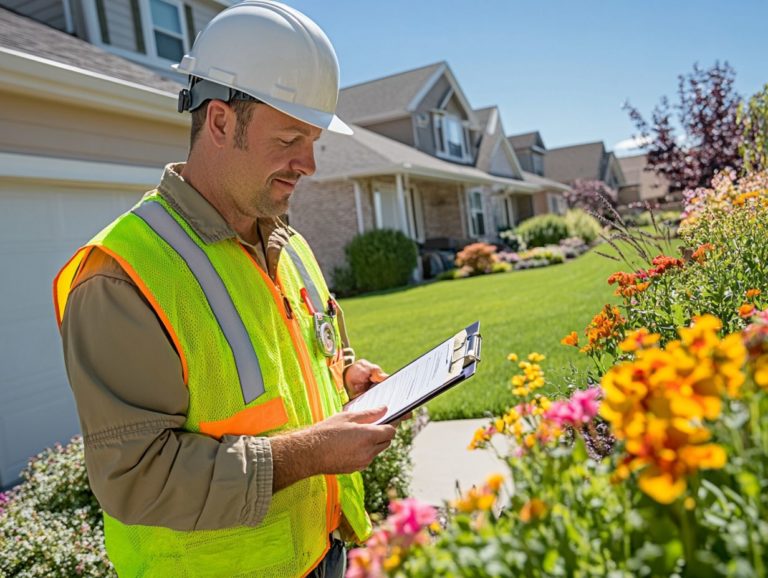Tips for Reading Between the Lines of a Home Report
When you’re searching for a new home, understanding the details of a Home Report can truly make a difference.
This vital document shows the condition of the property and emphasizes crucial details that could sway your decision. Knowing how to decipher this information becomes essential.
You’ll want to consider the questions to pose to sellers and appreciate the benefits of enlisting professional assistance.
Continue reading to arm yourself with the insights necessary for a successful home-buying journey.
Contents
- Key Takeaways:
- Understanding Home Reports
- Interpreting the Information
- Questions to Ask the Seller
- Seeking Professional Help
- Frequently Asked Questions
- What is the purpose of reading between the lines of a home report?
- What are some common things to look for when reading between the lines of a home report?
- How can I determine if the home report is accurate?
- What should I do if I find conflicting information in the home report?
- What tips can help me read between the lines of a home report more effectively?
- Why is it important to read between the lines of a home report?
Key Takeaways:

Look out for key sections like property condition and energy efficiency.
Identify red flags such as major repairs or discrepancies.
Ask the seller questions to clarify any concerns.
Understanding Home Reports
Understanding home reports is essential for anyone aiming to make informed decisions about residential properties, particularly in a diverse market like Los Angeles.
A comprehensive home report, often provided by experts such as Nick Yahoodain at Advanced Builders & Contractors, includes various components such as home inspection reports, property surveys, and boundary surveys.
These elements collectively offer a clearer picture of the property s condition and value. By carefully reviewing these reports, you can pinpoint significant renovations that may be required and evaluate safety hazards.
This knowledge helps you make educated financial investments in your future home.
What is a Home Report?
A home report is an invaluable document that brings together various assessments of a property’s condition, including property and boundary surveys. It provides you with a comprehensive overview of its structural integrity and any safety concerns that may arise.
Central to the home report is the home inspection checklist, which outlines the factors that require your attention. This checklist highlights structural issues like cracks in the foundation, sagging roofs, and deteriorating walls each of which can significantly affect the property’s market value.
Safety concerns are equally paramount; for instance, outdated wiring, mold presence, and the condition of plumbing systems can pose serious risks to anyone occupying the space.
Understanding these elements helps you evaluate the property s condition and future maintenance needs, empowering you to make informed and confident decisions.
Why are Home Reports Important?
Home reports are essential for you as a potential buyer or homeowner. They offer crucial insights into a property’s overall condition, allowing you to make informed financial investment decisions.
By thoroughly examining aspects like safety hazards and necessary repairs, these evaluations simplify the often overwhelming real estate process. The reports typically include vital zoning information, which can significantly impact future property use and value.
This wealth of data empowers you to weigh your options more effectively, ensuring your choices align with your long-term goals. With access to such comprehensive insights, you can navigate the market with greater confidence and clarity, contributing to a community of well-informed homeowners.
Interpreting the Information

Interpreting the details in a home inspection report or property survey is crucial for you as a prospective buyer or homeowner. It’s essential to grasp the implications of the findings outlined in the summary report fully.
Understanding these insights empowers you to make informed decisions about your investment and future home.
Key Sections to Pay Attention to
When you review a home inspection report, certain sections need your attention, especially those detailing safety hazards, property boundaries, and structural concerns. For insights on what to expect in a home inspection report, these factors can significantly impact the property’s value and safety.
Safety hazards, like faulty wiring or inadequate railings, pose immediate risks to anyone living there. This makes it essential for prospective buyers to scrutinize these areas closely.
Structural issues, such as cracks in the foundation or sagging beams, may hint at deeper problems that could lead to costly repairs in the future.
Understanding the property’s boundaries is equally vital. Encroachments or unresolved disputes can create legal complications that might scare off potential buyers. By carefully examining these critical areas, you empower yourself to make informed decisions, protecting both your investment and your well-being.
Common Red Flags to Look Out For
Identifying common red flags during a home inspection can help you avoid future headaches tied to safety concerns and major deficiencies.
Be vigilant about warning signs, such as outdated wiring or previous electrical issues. For instance, frayed wires or ungrounded outlets aren t just minor inconveniences; they can pose significant fire hazards.
Plumbing issues like water stains, low water pressure, or visible leaks can indicate underlying problems that might require extensive repairs. Overall safety concerns, such as mold or malfunctioning smoke detectors, can compromise the health and safety of everyone living there.
Stay diligent in considering these factors to steer clear of costly and potentially dangerous situations in the future.
Questions to Ask the Seller
When engaging with a seller, asking the right questions can yield invaluable insights into the property.
Pay particular attention to inquiries about the home inspection report, improvements made, and major renovations undertaken.
This knowledge empowers you to make informed decisions and navigate the buying process with confidence.
Clarifying Information and Addressing Concerns

Clarifying information and addressing concerns with the seller is crucial for understanding all aspects of the home inspection report. This can significantly influence your decision-making process.
To enhance communication, prepare specific questions in advance, targeting areas in the report that require discussion. By initiating a collaborative dialogue, both you and the seller can express your viewpoints, fostering a comfortable atmosphere for negotiation.
Ask about the timeline and scope of necessary repairs, as well as any warranties on previous work completed. Having a clear understanding of the seller s willingness to tackle these issues empowers you to make informed decisions and potentially leverage the findings in your offer.
Seeking Professional Help
Seeking professional assistance from a licensed home inspector is crucial for you as a buyer. This is especially important if potential safety hazards are highlighted in the home inspection report.
Engaging an expert ensures you make informed decisions, safeguarding both your investment and your peace of mind.
Hiring a Home Inspector
Hiring a qualified home inspector is essential. They perform a non-invasive inspection that identifies safety hazards and issues affecting your property’s value.
Start by researching licensed inspectors. Look for certified professionals with significant experience.
Check their track record by reviewing client testimonials and sample reports. This ensures they meet industry standards.
A non-invasive inspection is invaluable. It allows for thorough assessment without damaging the property.
This careful approach can uncover hidden dangers, like mold or faulty wiring, that might go unnoticed in a casual walkthrough.
Identifying these concerns early gives you the power to negotiate repairs, saving you significant money later.
Consulting with a Real Estate Agent
Consulting a real estate agent is a smart move for home buyers. These professionals provide insights into property measures and safety concerns.
They guide you through the complexities of buying a home. Their expertise helps you understand zoning laws and property boundaries.
Agents evaluate neighborhood safety, including crime rates and school quality. These factors significantly impact your satisfaction and property value.
Engaging a real estate agent is a wise financial investment. Their knowledge can lead to better negotiation outcomes and save you money.
With their help, you can uncover hidden issues and streamline the buying process. This ensures your investment aligns with your priorities.
Frequently Asked Questions

What is the purpose of reading between the lines of a home report?
The purpose of reading between the lines of a home report is to gain a deeper understanding of the property. This helps uncover potential issues that may not be clearly stated, so it’s important to know what to look for in a home inspection report.
What are some common things to look for when reading between the lines of a home report?
Look for discrepancies, vague language, and missing details. These can indicate potential red flags that need further investigation.
How can I determine if the home report is accurate?
Cross-reference the information with property records or previous inspection reports. Hiring a professional inspector can also help verify the property s condition.
What should I do if I find conflicting information in the home report?
If you find conflicting information, address it with the seller or their agent. Getting clarification is crucial to ensure the report is accurate and up-to-date.
What tips can help me read between the lines of a home report more effectively?
Pay attention to the language used in the report. Look for hidden clues and consider getting a second opinion from a professional if needed.
Why is it important to read between the lines of a home report?
Reading between the lines can reveal information that affects your decision to purchase the property. Understanding the basics of home inspection reports helps you avoid surprises or costly issues in the future.






